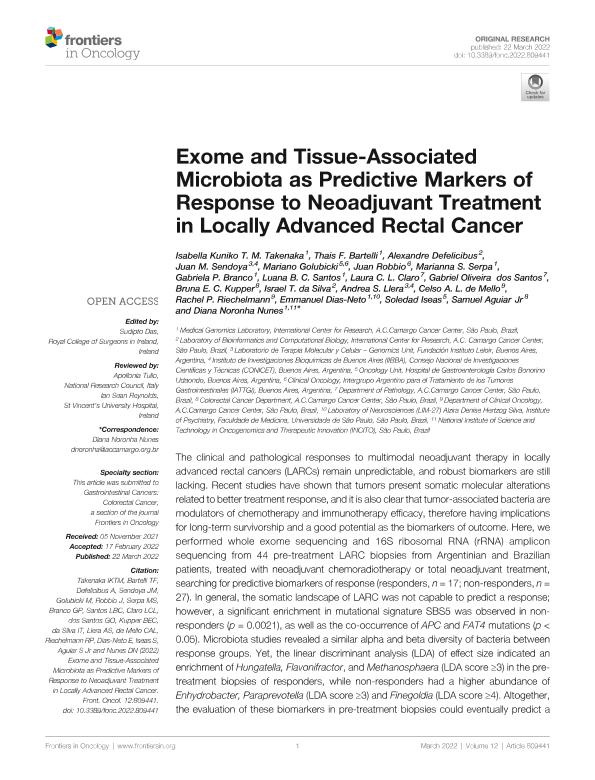Artículo
Exome and Tissue-Associated Microbiota as Predictive Markers of Response to Neoadjuvant Treatment in Locally Advanced Rectal Cancer
Takenaka, Isabella Kuniko T. M.; Bartelli, Thais F.; Defelicibus, Alexandre; Sendoya, Juan Martín ; Golubicki, Mariano; Robbio, Juan; Serpa, Marianna S.; Branco, Gabriela P.; Santos, Luana B. C.; Claro, Laura C. L.; Oliveira dos Santos, Gabriel; Kupper, Bruna E. C.; da Silva, Israel T.; Llera, Andrea Sabina
; Golubicki, Mariano; Robbio, Juan; Serpa, Marianna S.; Branco, Gabriela P.; Santos, Luana B. C.; Claro, Laura C. L.; Oliveira dos Santos, Gabriel; Kupper, Bruna E. C.; da Silva, Israel T.; Llera, Andrea Sabina ; de Mello, Celso A. L.; Riechelmann, Rachel P.; Dias Neto, Emmanuel; Iseas, Soledad; Aguiar, Samuel; Nunes, Diana Noronha
; de Mello, Celso A. L.; Riechelmann, Rachel P.; Dias Neto, Emmanuel; Iseas, Soledad; Aguiar, Samuel; Nunes, Diana Noronha
 ; Golubicki, Mariano; Robbio, Juan; Serpa, Marianna S.; Branco, Gabriela P.; Santos, Luana B. C.; Claro, Laura C. L.; Oliveira dos Santos, Gabriel; Kupper, Bruna E. C.; da Silva, Israel T.; Llera, Andrea Sabina
; Golubicki, Mariano; Robbio, Juan; Serpa, Marianna S.; Branco, Gabriela P.; Santos, Luana B. C.; Claro, Laura C. L.; Oliveira dos Santos, Gabriel; Kupper, Bruna E. C.; da Silva, Israel T.; Llera, Andrea Sabina ; de Mello, Celso A. L.; Riechelmann, Rachel P.; Dias Neto, Emmanuel; Iseas, Soledad; Aguiar, Samuel; Nunes, Diana Noronha
; de Mello, Celso A. L.; Riechelmann, Rachel P.; Dias Neto, Emmanuel; Iseas, Soledad; Aguiar, Samuel; Nunes, Diana Noronha
Fecha de publicación:
03/2022
Editorial:
Frontiers Media
Revista:
Frontiers in Oncology
ISSN:
2234-943X
Idioma:
Inglés
Tipo de recurso:
Artículo publicado
Clasificación temática:
Resumen
The clinical and pathological responses to multimodal neoadjuvant therapy in locally advanced rectal cancers (LARCs) remain unpredictable, and robust biomarkers are still lacking. Recent studies have shown that tumors present somatic molecular alterations related to better treatment response, and it is also clear that tumor-associated bacteria are modulators of chemotherapy and immunotherapy efficacy, therefore having implications for long-term survivorship and a good potential as the biomarkers of outcome. Here, we performed whole exome sequencing and 16S ribosomal RNA (rRNA) amplicon sequencing from 44 pre-treatment LARC biopsies from Argentinian and Brazilian patients, treated with neoadjuvant chemoradiotherapy or total neoadjuvant treatment, searching for predictive biomarkers of response (responders, n = 17; non-responders, n = 27). In general, the somatic landscape of LARC was not capable to predict a response; however, a significant enrichment in mutational signature SBS5 was observed in non-responders (p = 0.0021), as well as the co-occurrence of APC and FAT4 mutations (p < 0.05). Microbiota studies revealed a similar alpha and beta diversity of bacteria between response groups. Yet, the linear discriminant analysis (LDA) of effect size indicated an enrichment of Hungatella, Flavonifractor, and Methanosphaera (LDA score ≥3) in the pre-treatment biopsies of responders, while non-responders had a higher abundance of Enhydrobacter, Paraprevotella (LDA score ≥3) and Finegoldia (LDA score ≥4). Altogether, the evaluation of these biomarkers in pre-treatment biopsies could eventually predict a neoadjuvant treatment response, while in post-treatment samples, it could help in guiding non-operative treatment strategies.
Archivos asociados
Licencia
Identificadores
Colecciones
Articulos(IIBBA)
Articulos de INST.DE INVEST.BIOQUIMICAS DE BS.AS(I)
Articulos de INST.DE INVEST.BIOQUIMICAS DE BS.AS(I)
Citación
Takenaka, Isabella Kuniko T. M.; Bartelli, Thais F.; Defelicibus, Alexandre; Sendoya, Juan Martín; Golubicki, Mariano; et al.; Exome and Tissue-Associated Microbiota as Predictive Markers of Response to Neoadjuvant Treatment in Locally Advanced Rectal Cancer; Frontiers Media; Frontiers in Oncology; 12; 3-2022; 1-16
Compartir
Altmétricas



